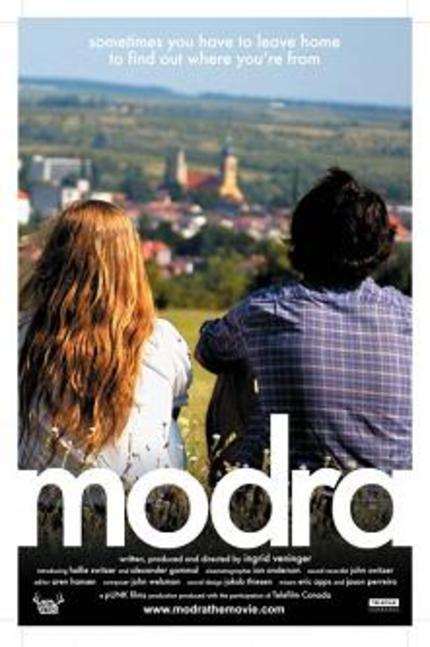BIFF 2011: MODRA review

The problem with Ingrid Veninger's Modra is it's not much of a film. Two American teenagers visit a small European town, one trying to reconnect with her ethnic background, both trying to make sense of adolescent hormones. On the one hand, to say it's not much of a film is a facile over-simplification - the director's connection with the story is obvious in the amount of work she and her crew have put in, not to mention some beautifully naturalistic performances from her leads.
On the other hand, it's plain to see Veninger is a little too connected to the project; she went through a similar experience as a young woman, and this is evident for all the wrong reasons. Modra starts out well, but it steadily falls apart as you realise it's less a film than a video diary. It wants to talk about young people trying to find an identity for themselves, or how the world works. But the way the director tells her story gives the impression when she's talking to the younger generation she's saying this is the way things are, rather than offering her take on events as concerned advice.
Lina (Hallie Switzer) is the one who's organised the trip, wanting to visit the little town in Slovakia she spent her early childhood in, just before her parents had to flee the country. Just as the film starts, though, her boyfriend - who she was planning on travelling with - has just dumped her. Completely by chance Lina gets a phone call from her schoolmate Leco (Alexander Gammal), who wants to try his luck asking her out. On a whim, Lina asks Leco if he'd like to come to Europe with her.
Switzer and Gammal are easily the best thing about the film, all but carrying the first act together. Neither looks much like the stereotypical idealised teenager (she too curvy, he a little too brooding and introspective) but they're both good-looking and personable enough it seems believable Lina and Leco would be attracted to each other. Both are plausibly eloquent, though not too much - able to make small talk easily enough but clearly conflicted, with Lina wondering whether bringing a stranger along was such a good idea and Leco wondering what he stands to get out of the trip.
The premise initially seems fine; Veninger doesn't push the culture shock too hard, while the two young leads manage an endearingly awkward chemistry trying their best not to be Americans abroad. Whether through good direction, natural ability or both there are times Switzer, in particular, seems so happy to be there you start to wonder if she's really acting. Veninger pushes for warm, relaxed and intimate, with Lina chatting to any number of elderly relatives or family friends and all of them taking their turn to smile at the camera.
The trouble is none of this goes much of anywhere. While Switzer and Gammal are talented enough to invest Lina and Leco with personalities the script never really fleshes them out as people. Lina barely changes over the course of the film: we barely see anything of her life in America. She starts out as a generally decent, if impetuous young person and never hints at what it was she had missing, or felt she lacked, that compelled her to travel several thousand miles to drop in on her extended family.
All of which is not to say Veninger should have forced the audience to acknowledge how important Lina's journey is supposed to be. At the same time, when the director tries to make the big arc of the film the faltering relationship between Lina and Leco the story goes steadily off the rails from that point on. What starts as a credibly empathic look at two young people trying to make the best of an unusual situation ends up frustratingly close to a Very Special Episode of some generic afternoon TV drama.
It's not much of a surprise that Lina and Leco's relationship (such as it is) doesn't progress particularly smoothly. The thing is, the way Veninger portrays this smacks of someone working from an adult perspective of how teenagers behave, in the worst possible sense - that she's made up her mind about how things happen. Modra tries to wind up on a realistic, pragmatic note, but seems to be implying teenagers are infantile social cripples obsessing over trivialities until a wise, all-knowing adult figure comes along to set them straight.
Next to
something like Mike Ott's Littlerock, a film with a strikingly
similar plotline but where puppy love is simultaneously ephemeral and
important - or where adolescents can do truly stupid things but
still display wisdom and compassion - Modra feels as awkward and
stilted as its leads. It means well; Ingrid Veninger clearly wants to
let people know she's been there, or felt that. But it makes empathy
and good advice feel like a Sunday school homily. Too many other
films suggest they do actually know what it was like to be young to
be able to recommend this one.
(Modra was screened as part of the 17th Bradford International Film Festival, held at the UK's National Media Museum from 16th-27th March 2011.)







